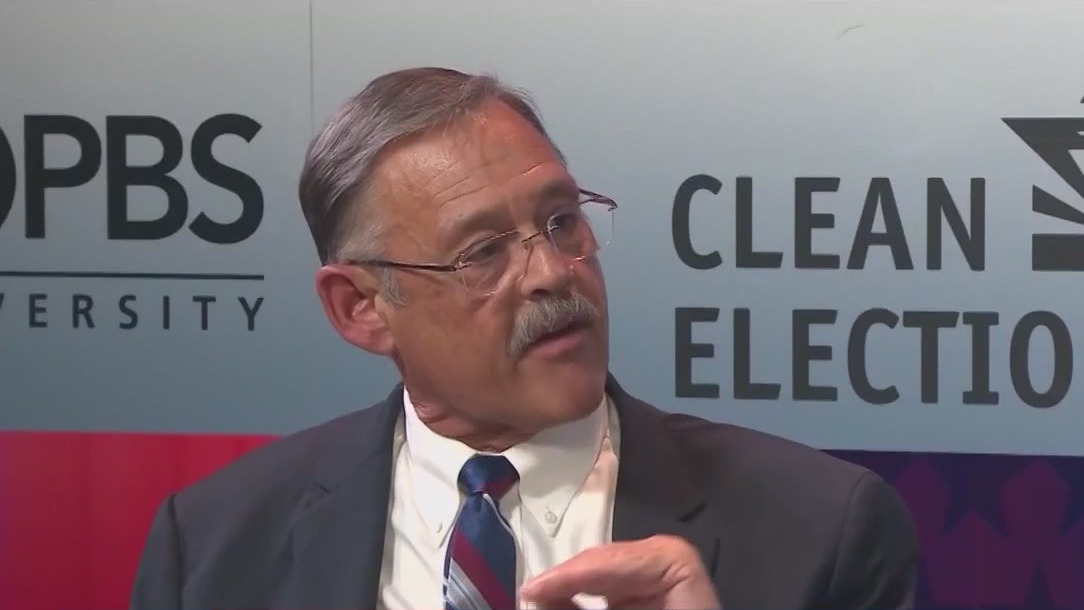Mark Finchem: Arizona judge dismisses lawsuit challenging secretary of state election results
PHOENIX - A Maricopa County judge granted a motion to dismiss a lawsuit filed by Mark Finchem over the November election that saw his defeat by Democrat Adrian Fontes.
According to court documents released by the Clerk of the Superior Court Jessica Fotinos on Dec. 16, Judge Melissa Julian granted Secretary of State Katie Hobbs' motion to dismiss the election contest, with prejudice, and confirmed the election of Fontes as Secretary of State-elect.
As a result of the ruling by Judge Julian, a virtual status conference on the case that was set for Dec. 19 was declared moot, and lawyers for Hobbs and Fontes may file a motion for sanctions within 10 days of the ruling.
According to Cornell Law School's Legal Information Institute, when a judge dismisses a lawsuit with prejudice, it means the plaintiff cannot refile the same claim again in that court, because it is considered an "adjudication on the merits."
"An adjudication on the merits means that the court has made a determination on the legal and factual issues of the claim. Once a plaintiff’s claim is adjudicated on the merits, they cannot bring the same claim again," read a portion of the website.
Judge rebuffs various claims by Finchem

Mark Finchem
In the 13-page ruling, Judge Julian rebuffed various claims made by Finchem in the lawsuit, including a claim that the current Secretary of State, Katie Hobbs, abused her power by failing to have tabulation machines properly certified, failing to recuse herself, and for threatening the Boards of Supervisors in Mohave and Cochise Counties with criminal charges if they did not certify the election on time.
"We are entitled to have a hearing on charges of fraud or deception, and we believe that there is deception in the practice in the state of not dealing fairly and not coming forward to the different counties that protested the election and saying to them," said the attorney for Finchem, Daniel McCauley, during oral arguments held on Dec. 16. "Maybe you have a point. Give us your evidence we will consider it. I mean, that’s the way the Secretary of State should be handling it. She deceived them. She said no, this is a great election, everything is fine."
Judge Julian wrote, in her ruling, that under state law, recusal is only required if a public officer or employee has a "nonspeculative pecuniary [money] or proprietary [ownership] interest, either direct or indirect, other than a remote interest."
"Seeking or holding a public office does not grant elected officials a financial or ownership interest in the job they hold or seek. To the contrary, ‘the nature of the relation of a public officer to the public is inconsistent with either a property or a contract right. Every public office is created in the interest and for the benefit of the people, and belongs to them,’" Judge Julian wrote.
As for claims that legal threats made by Hobbs' office over election certification constituted misconduct, Judge Julian ruled that "it is not ‘misconduct’ for the Secretary of State to communicate with other governing bodies to ensure the canvass and certification are completed."
On the issue of voting machine certification, Judge Julian wrote that Finchem was barred by laches, a legal doctrine that bars legal action due to excessively long delay, from raising the issue, as he alleges the machine's certification expired in 2017, and that a purportedly defective certificate was issued on Feb. 1, 2021.
"Mr. Finchem could have brought a challenge regarding the laboratory testing of voting machines anytime in the last five years (or minimally at any time since February 2021), Mr. Finchem’s unjustifiable delay resulted in an election being conducted under conditions he belatedly finds objectionable," read a portion of the ruling.
Judge Julian also commented on other aspects of Finchem's claims, in regards to voting machine certification.
Previous reports

Judge in Arizona tosses Mark Finchem's election lawsuit
Finchem, the defeated Republican Party candidate for Secretary of State, accused Secretary of State Katie Hobbs of abusing her power, and asked a judge to order a new election.

Arguments heard in Mark Finchem's election lawsuit
Finchem, the GOP candidate for Arizona Secretary of State, was defeated by Democrat Adrian Fontes in the November election. He is accusing Secretary of State Katie Hobbs of abusing her power, and is asking a judge to order a new election. FOX 10's Stephanie Bennett reports.

Hearings for Kari Lake, Mark Finchem election lawsuits
Hearings were scheduled to be held on Dec. 13 for election lawsuits filed by Kari Lake and Mark Finchem. Sen. Wendy Rogers tweeted out meeting information for Lake's hearing that was meant to be seen by only lawyers. More than 350 people joined the meeting, causing a delay. Lake herself tweeted that neither she nor her attorneys could access the hearing. In Finchem's case, a judge scheduled the hearing to dismiss the case. If the judge decides to not throw out the case, a hearing will be held on it next week.

